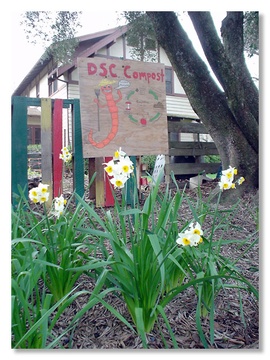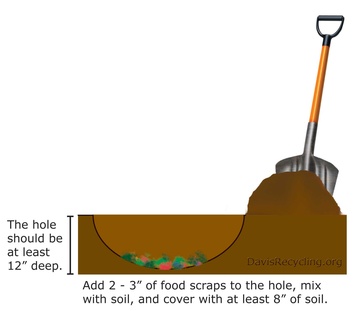Compost refers to decomposed organic waste that is used as fertilizer. It can be considered a type of recycling and is used in of sustainable agriculture. Compost is one of nature's best mulches and garden amendments, improving soil structure, texture, and water-retention characteristics. The organic matter in compost feeds microorganisms which naturally produce nitrogen, potassium, and phosphorus. Producing and using compost also helps reduce human production of waste — landfills are brimming and nobody wants one in their backyard! Best of all, compost is cheap and the City of Davis will even provide you with a cheap compost bin.
How to compost
 Almost any organic material is suitable for composting, but the pile needs a proper ratio of carbon-rich materials (aka "browns") and nitrogen-rich materials (aka "greens"). Brown materials include dried leaves, straw and wood chips while green materials are fresh vegetation such as grass clippings and kitchen scraps. Achieving the best blend of greens:browns is not an exact science, but a good target ratio is about 25:1 part browns:greens by weight. Too much carbon hinders breakdown of materials while excess nitrogen makes for a big stinky pile.
Almost any organic material is suitable for composting, but the pile needs a proper ratio of carbon-rich materials (aka "browns") and nitrogen-rich materials (aka "greens"). Brown materials include dried leaves, straw and wood chips while green materials are fresh vegetation such as grass clippings and kitchen scraps. Achieving the best blend of greens:browns is not an exact science, but a good target ratio is about 25:1 part browns:greens by weight. Too much carbon hinders breakdown of materials while excess nitrogen makes for a big stinky pile.
All additions to your compost pile will decompose more quickly if they are chopped up before adding. Grass clippings break down quickly and contain as much nitrogen as manure. Since fresh grass clippings will clump, become anaerobic and start to smell, mix them with plenty of brown material or dry them out in the sun before composting. Most kitchen scraps can be composted, but meat products, dairy products, and high-fat foods will decompose slowly, smell bad, and attract pests and vermin. Egg shells are great, but decompose slowly and should be crushed first. Be sure to bury food scraps deep in the pile—don't leave them on top or you'll just be feeding the rats.
Leaves and other large pieces of materials will break down slowly, so chipping wood and grinding leaves will reduce the size of your compost pile and speed decomposition. Also keep in mind that some leaves, such as live oak, magnolia and holly are too tough and leathery for composting while all parts of the black walnut tree contain a toxin that survives composting. Eucalyptus leaves can also contain a toxin that may be harmful to other plants after composting. And of course, avoid using poison oak and sumac!
Please read this article on the use of eucalyptus in composting. http://slosson.ucdavis.edu/documents/1993-19942140.pdf More on the benefits of Eucalyptus in composting for plants and vegetables… A California research project on Eucalyptus leaves in compost: http://ucanr.org/repository/CAO/landingpage.cfm?article=ca.v047n03p22&fulltext=yes. The finding that both sludge products similarly affect crop growth indicates Eucalyptus trimmings (present in the compost, but not in the heat-dried sludge) do not suppress crop growth at the rates being evaluated in this study. This is an important point because it was initially feared that allelopathic compounds in the Eucalyptus would inhibit crop growth. The authors hypothesize that the composting process degrades the allelopathic compounds into harmless products.  In-ground composting is a very simple and pest-resistant way to compost your food scraps. Just bury them in the ground!
In-ground composting is a very simple and pest-resistant way to compost your food scraps. Just bury them in the ground!
In summary, the field experiment showed that incorporating sewage sludge compost 4 inches deep as a soil amendment in spring plantings significantly increased yields of onion, snapdragon, turf and spinach. Greenhouse experiments produced similar results and demonstrated that the presence of Eucalyptus trimmings in compost does not depress yields.
Once you've got a good pile going, it will eventually decompose into a rich dark humus, but it may take a year if you do nothing else! To speed up the process and harvest your humus as early as four weeks, water your pile occasionally and turn it over about once a week. Organic waste needs water to decompose, so keep your pile about as moist as a wrung-out sponge. Don't go too nuts with the water though, a soggy compost pile becomes anaerobic, which will slow decomposition. If you're building your pile with wet materials mix in dry materials as you go along, and if your materials are particularly dry, wet it down as you build it up. Oxygenating your compost pile is the other part of this equation: the pile needs to be turned or mixed with some regularity because the temperature in the middle of the pile is warmer than the outer areas and you want to get the whole thing to cook evenly. Whenever you turn your compost pile, check it for moisture and add water as necessary.
The City of Davis has a lot of composting information on their website, with pages on backyard composting, worm composting and composting food scraps. Videos, fliers, pictures and more.
A very simple way to compost your food scraps is just to bury them at least 8 inches deep in your garden, a process known as in-ground composting. Garden soil provides a natural barrier that keeps out flies and other pests, and holds in moisture and odors. If you have dogs that like to dig in your garden, this might not work very well.
Food scraps can be buried in empty areas of vegetable and flower gardens, or in holes outside the drip line (below the ends of branches) of trees and shrubs. This is great in the fall and winter to prepare your veggie beds for spring planting. Dig a hole or trench about 1 foot deep. Add 2 to 3 inches of food scraps to the hole. Chop and mix scraps into soil, then cover the food scraps with at least 8 inches of soil to keep pests out.
Food scraps may take from 1 to 6 months to decompose depending on the season, moisture, soil and the type of food scraps that are buried. Seeds and small seedlings may be planted on top of buried food scraps immediately. Large transplants should not be planted until the food has decomposed. Do not bury more food scraps in the same place until the first scraps have been fully composted.
City of Davis Organics Program
Organics Collection service has come to all customers, as of July 11, 2016!
In July 2016, the current system of collecting yard material loose in the street will change to a hybrid system of yard material piles and organics carts. Once the Organics Program begins, all residents and businesses in Davis will have access to food scrap recycling service through Davis Waste Removal. This organics program will help the City achieve its 75% waste diversion goal.
Organics collection carts will be delivered to all customers (residents, apartment communities and businesses) June 20 - July 8. Organics collection service will start the week of July 11. Organics carts are serviced once a week, on the same day as trash and recycling. See the service map to find your service day. Collection begins at 7:00 a.m. Containers may be brought to the curb after 5:00 p.m. on the day before collection and should be removed by 7:00 a.m. on the day following collection. DWR operates on all holidays except Christmas and New Year's Day. Call DWR (756-4646) if you have any questions.
Starting July 2016:
- Yard material piles may be placed in the street no sooner than 5 days before a schedule pick-up.
- Yard material piles are not allowed in the downtown core area (the area bounded by 5th Street, the south side of 1st Street, the west side of B Street and the Union Pacific railroad tracks).
- Leaves and grass are not allowed in yard material piles unless the organics cart is already full.
-
Streets are swept once per month, the week after yard material pile pick-up.
Compost Classes
- The City of Davis offers free composting classes in the fall and spring. In addition to backyard composting, these classes place a particular emphasis on simple, pest-free methods of composting food scraps. After attending a class, Davis residents can sign up to receive a starter set of composting worms for $5 and residents in single-family homes can receive a backyard compost bin for $10. To register for a class, call the Public Works at 757-5686, email [email protected]
- The City of Davis offers a year-round compost correspondence course to Davis residents in single-family homes. To enroll, call Public Works at 757-5686, or email [email protected]. Once you receive the packet, read the materials inside, fill out the enclosed quiz and return the quiz to the Public Works Department. A city staff-person will contact you to let you know that your quiz was received and that your compost bin is available for pick-up. A $10 fee will be charged for a compost bin.
- Project compost will often offer classes on composting and worm composting.
Composters
Local Compost Experts
Compost Users
- The E Street Commune has a bunch of compost piles, which is really cool. They know what's going on.
- Student Farm
- On Campus Coops
Composting Groups
Users of compostable plates and utensils
Events
Restaurants
- Ali Baba — Some (not all) of their take-out containers are compostable
- Yogurt Shack — Compostable cups for yogurt
- Add restaurants that use compostables for take-out here.
- See also the Commercial Food Scrap Pilot Program.
2006-06-04 22:02:33 According to DavisRecycling.org, you can call 757-5686 to get a free compost bin! —CharlesWinkelmann
2007-01-22 03:05:24 Or you can take out a spade and make one yourself! Assuming you have property you can dig on. Like my dad does, we had rotating compost holes in the backyard at all times when I was growing up (and the practice lives on to this day) —StevenDaubert
2008-06-07 02:41:25 Anyone know where I can get a 55-gallon drum that was used for something edible? —PeterGee
2010-05-23 09:13:58 Please read this article on the use of eucalyptus in composting. If you are going to present facts, they should be backed by research: http://slosson.ucdavis.edu/documents/1993-19942140.pdf
More on the benefits of Eucalyptus in composting for plants and vegetables… A California research project on Eucalyptus leaves in compost:
http://ucanr.org/repository/CAO/landingpage.cfm?article=ca.v047n03p22&fulltext=yes The finding that both sludge products similarly affect crop growth indicates Eucalyptus trimmings (present in the compost, but not in the heat-dried sludge) do not suppress crop growth at the rates being evaluated in this study. This is an important point because it was initially feared that allelopathic compounds in the Eucalyptus would inhibit crop growth. The authors hypothesize that the composting process degrades the allelopathic compounds into harmless products. In summary, the field experiment showed that incorporating sewage sludge compost 4 inches deep as a soil amendment in spring plantings significantly increased yields of onion, snapdragon, turf and spinach. Greenhouse experiments produced similar results and demonstrated that the presence of Eucalyptus trimmings in compost does not depress yields —webscience
<div id="cke_pastebin"> </div>




Comments:
You must be logged in to comment on this page. Please log in.